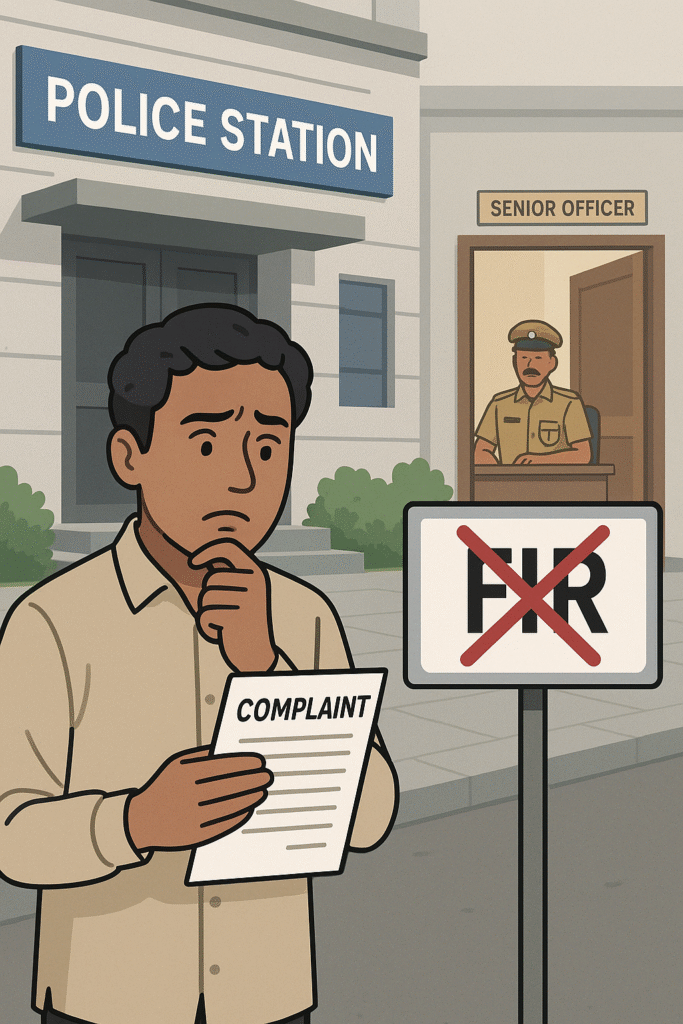Introduction
Registering a First Information Report (FIR) is the crucial first step in seeking justice for crimes like theft, assault, or harassment. Under Indian law, police are legally bound to register an FIR for any cognizable offence. Yet, many people still face refusals, delays, or excuses when they approach the police.
Police not lodging FIR? What to do? Updated 2025 July. This guide, updated for July 2025, explains your rights, the latest legal safeguards, and practical steps you can take if police refuse to lodge your FIR.
1. Your Right to Register an FIR
- Section 154 of the Criminal Procedure Code (CrPC), 1973 mandates that police must register an FIR if a cognizable offence is reported.
- The Supreme Court’s judgment in Lalita Kumari v. Government of UP (2013) still governs this area — making registration of an FIR mandatory if the information discloses a cognizable offence.
- Common examples: theft, physical assault, sexual harassment, domestic violence, and many cybercrimes (depending on the facts).
2. Why Police Sometimes Refuse
Despite the law, refusals happen for reasons like:
- Claiming “it’s a civil matter” (often misapplied)
- Jurisdiction excuses: “Wrong police station”
- Pressure from influential accused persons
- Informal settlements or bribes
- Misclassification as non-cognizable
Tip: Theft, assault, and most harassment cases are clearly cognizable under the Indian Penal Code (IPC).
3. Updated Legal Remedies (2025)
If police refuse to register an FIR in 2025, here’s what you can do:
a) Approach a Senior Officer
- Section 154(3) CrPC: Send a written complaint to the Superintendent of Police (SP) or Deputy Commissioner of Police (DCP).
- Take a copy and get an acknowledgment.
- Many states now have mandatory complaint tracking numbers under new police reforms — insist on this.
b) Online FIR & E-Complaint Portals
- Most states have upgraded online FIR systems — check your State Police’s official portal.
- Many police stations accept complaints by WhatsApp or official grievance apps — keep screenshots of your submission.
c) File a Complaint Before a Magistrate
- Under Section 156(3) CrPC, approach the Judicial Magistrate First Class (JMFC) or Metropolitan Magistrate.
- The Magistrate can order the police to register an FIR and start an investigation.
How Long Can Police Keep You in Lock-Up in India? A Legal Overview
d) Right to Information (RTI)
- You can file an RTI to know why your FIR wasn’t registered. This often pushes reluctant officers to act.
e) Constitutional Remedies
- If repeated complaints are ignored, file a writ petition under Article 226 in the High Court for directions to the police.
- Courts can impose penalties on erring officers for contempt or dereliction of duty.
4. Practical Steps to Protect Yourself
- 1. Always submit your complaint in writing.
2. Carry at least two copies — one for the station, one with you.
3. Get an acknowledgment with date and stamp.
4. Record names, ranks, and badge numbers of police officers involved.
5. If safe, record conversations or refusal statements discreetly.
6. Take a trusted person with you.
7. Seek legal help if the refusal continues.
5. Penalties for Police Officers (2025)
Under current law and guidelines:
- Officers who deliberately refuse to register an FIR can face departmental action, suspension, and contempt proceedings.
- The Supreme Court and many High Courts have reiterated this in multiple rulings as recently as 2024–2025.
Conclusion
The law is clear: if you report a cognizable offence like theft, assault, or harassment, the police must lodge your FIR. If they don’t, you have powerful legal tools to enforce your right.
Don’t stay silent — know your rights, use legal remedies, and get professional help if needed.
| Topic | Key Points |
|---|---|
| Your Right to Register an FIR |
|
| Common Reasons Police Refuse |
|
| What You Can Do (Updated 2025) |
|
| Practical Tips |
|
| Penalties for Police (2025) |
|
Need Assistance?
If you’re struggling with police inaction, our team of experienced criminal lawyers can help you draft complaints, approach senior officers, file court petitions, and protect your rights.
📞 Contact us today for a confidential consultation.
Last Updated: July 2025

